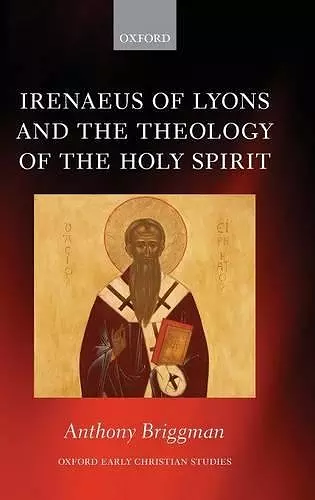Irenaeus of Lyons and the Theology of the Holy Spirit
Format:Hardback
Publisher:Oxford University Press
Published:12th Jan '12
Currently unavailable, and unfortunately no date known when it will be back

Irenaeus' theology of the Holy Spirit is often highly regarded amongst theologians today, but that regard is not universal, nor has an adequate volume of literature supported it. This study provides a detailed examination of certain principal, often distinctive, aspects of Irenaeus' pneumatology. In contrast to those who have suggested Irenaeus held a weak conception of the person and work of the Holy Spirit, Anthony Briggman demonstrates that Irenaeus combined Second Temple Jewish traditions of the spirit with New Testament theology to produce the most complex Jewish-Christian pneumatology of the early church. In so doing, Irenaeus moved beyond his contemporaries by being the first author, following the New Testament writings, to construct a theological account in which binitarian logic did not diminish either the identity or activity of the Holy Spirit. That is to say, he was the first to support his Trinitarian convictions by means of Trinitarian logic. Briggman advances the narrative that locates early Christian pneumatologies in the context of Jewish traditions regarding the spirit. In particular, he argues that the appropriation and repudiation of Second Temple Jewish forms of thought explain three moments in the development of Christian theology. First, the existence of a rudimentary pneumatology correlating to the earliest stage of Trinitarian theology in which a Trinitarian confession is accompanied by binitarian orientation/logic, such as in the thought of Justin Martyr. Second, the development of a sophisticated pneumatology correlating to a mature second century Trinitarian theology in which a Trinitarian confession is accompanied by Trinitarian logic. This second moment is visible in Irenaeus' thought, which eschewed Jewish traditions that often hindered theological accounts of his near contemporaries, such as Justin, while adopting and adapting Jewish traditions that enabled him to strengthen and clarify his own understanding of the Holy Spirit. Third, the return to a rudimentary account of the Spirit at the turn of the third century when theologians such as Tertullian, Origen, and Novatian repudiated Jewish traditions integral to Irenaeus' account of the Holy Spirit.
The arguments contained in this study are painstakingly constructed, developed through close and careful analysis of the Irenaean texts and in conversation with a wealth of Irenaean scholarship. ... an important contribution to our understanding of Irenaeus' theology, as well as our understanding of early Christian pneumatology. * Greg Hillis, Journal of Ecclesiastical History *
ISBN: 9780199641536
Dimensions: 241mm x 162mm x 21mm
Weight: 562g
264 pages